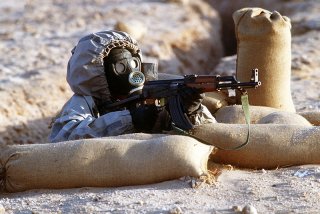Dodging Death: America’s Mission to Find and Destroy Syria’s Chemical Weapons
Joby Warrick argues in his new book Red Line the international effort to remove Syria’s chemical weapons was unprecedented and a story of multilateral success.
The Syrian regime attacked the town of Ghouta in southwestern Syria with sarin, a nerve agent, that killed hundreds of civilians on August 21, 2013. With that, Syrian president Bashar al-Assad crossed a red line set by President Barack Obama, accelerating an effort to eliminate Assad’s stockpile of chemical weapons.
Joby Warrick, a Pulitzer Prize-winning author, recently discussed this historic undertaking to deprive Assad of the bulk of his nerve agents and production equipment. He joined Press the Button, a podcast from the Ploughshares Fund, to talk about his newest book Red Line: The Unraveling of Syria and America's Race to Destroy the Most Dangerous Arsenal in the World.
In his book, Warrick reflects on America’s mission to find and destroy Syria’s chemical weapons and keep them out of the hands of the Islamic State.
While the United States and others had already been working to respond to the limited use of chemical weapons before that moment, after the large attack in Ghouta, the United States was faced with a choice of whether to pursue military action. Interestingly, a Russian initiative paved the way for a diplomatic resolution instead. In September 2013, the United Nations Security Council adopted Resolution 2118 that required Syria to destroy all chemical weapons until mid-2014. Warrick highlights that it was the first time in history that a stockpile was removed in the middle of a war.
In his book, he reconstructs the history of the Syrian chemical weapons program, as well as key decision points to avoid a catastrophic leakage of deadly nerve agents to Syrian combatants and terrorist groups. Warrick was struck by how close Al Nusra, an Al-Qaeda affiliate, or the Islamic State, came to gaining hold of Syria’s chemical weapons and material.
He further explained how challenging it was to remove the material. Syrian citizens had been risking their lives to bring evidence of the use of chemical agents to the outside world, according to Warrick. Further, “the Pentagon, the people who put together the plan to get the chemicals out and destroy them, they took part in what was for some of them, the most important mission of their lives and it happened in a flash in historical terms,” Warrick said.
Despite the success to remove some chemical weapons during the war, the Syrian regime preserved a part of its arsenal and conducted several more large-scale attacks, including those in Khan Shaykhun in April 2017 and Douma in April 2018. It has been challenging to find justice. Warrick argued that Assad “wasn't really held accountable. To this day he’s never had to admit to using chemical weapons against his own people. He always denies it. Russia supports them at the UN. Any action that's meaningful is always blocked by Russia.”
Warrick suggested that more needs to be done. “The evidence is continuing to mount, and one can envision a day—and it might not be this year or next, but someday—when Syria will be held accountable in some way before the world court or before the UN,” he said.
This delayed accountability is not new in international conflict. Warrick reminded the listeners of the Balkan conflict in the 1990s where it took twenty years until justice was served. “It’s important not to give up, not to think that, just because time has passed that it's not relevant anymore, but to keep pushing that boulder up the hill to hopefully one day see that Syrian victims have their moment of justice,” he said.
Despite all the challenges, Warrick succeeded in recapturing the story of the Syrian regime crossing the red line and subsequent international action. Removing thirteen hundred tons of the chemical weapons stockpile and manufacturing equipment is a story of an unprecedented international effort. Albeit imperfect—as Assad’s intentions weren’t changed and he used the chemical agents again—the diplomatic path and consequent removal of some of the weapons showed what multilateral success can look like.
The entire interview with Joby Warrick is available here on Press the Button.
Doreen Horschig is the current Roger L. Hale Fellow at the Ploughshares Fund, a global security foundation. She received her PhD in security studies from the University of Central Florida and studies nuclear policy, specifically public opinion and counter-proliferation, as well as norms of nuclear and chemical weapons. You can follow her on Twitter @doreen__h.

